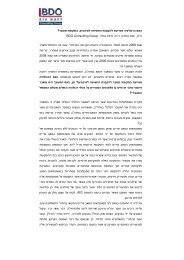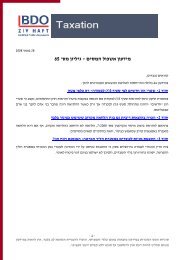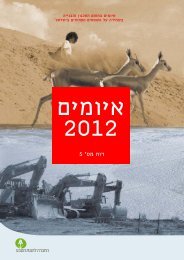preface
preface
preface
Create successful ePaper yourself
Turn your PDF publications into a flip-book with our unique Google optimized e-Paper software.
2.3. FACTS AND FIGURES<br />
BDO Israel<br />
DOING BUSINESS IN ISRAEL<br />
Israel is situated along the Mediterranean coast, on an area with the size of<br />
22,000 km. (8,500 sq.m.), including the Golan Heights, without the Gaza Strip<br />
and parts of the West Bank, which were given to the Palestinians in the context<br />
of the Peace Process and the Disengagement Plan.<br />
Israel is 430 km (265 miles) long and between 110 km (70 miles) to 10 km (6<br />
miles) wide. It has borders with Lebanon in the north, Syria and Jordan in the<br />
east, Egypt in the south and with areas under the Palestinian Authority.<br />
Modern Israel has numerous ancient sites and ruins, with ongoing<br />
archeological digs. New archeological findings are constantly discovered.<br />
Israel’s terrain varies from hilly, mountainous landscape, with rich agricultural<br />
land in the north, to barren desert sites in the south. The lowest place on the<br />
globe, the Dead Sea, is situated in the south of Israel.<br />
Israel’s major cities:<br />
Jerusalem – The capital of Israel and location of the Knesset and numerous<br />
historic and religious sites; population - approximately 774 thousand.<br />
Tel-Aviv – Israel’s major city - financial, commercial and industrial center,<br />
with a population of approximately 404 thousand.<br />
Greater metropolitan area – approximately 1.28 million.<br />
Haifa – Principal port city in the north of Israel, with a population of<br />
approximately 266 thousand.<br />
Beer Sheva – The largest city in the Negev desert (in the south), with a<br />
population of approximately 195 thousand.<br />
Israel’s climate is characterized by a hot and humid coastal climate, with a dry<br />
desert climate in the summer (July to September). The temperatures at this time<br />
of year vary from 28ºC (82.4ºF) in the north to 40ºC (104ºF) in the south.<br />
Winter begins around November and lasts until March, with relatively mild but<br />
rainy weather. A typical winter day in Jerusalem is about 5ºC (41ºF).<br />
Israel’s average annual rainfall varies from over 800 mm (31 inches) in the<br />
north (Upper Galilee) to less than 40 mm (1.6 inches) in the south (Eilat).<br />
The prevailing system for measurement is the metric system.<br />
17

















